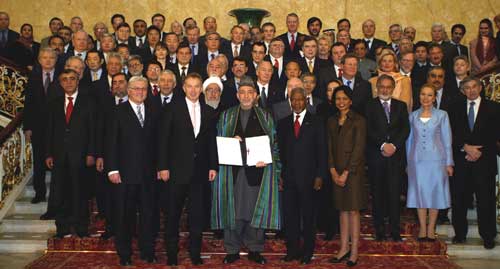
Participants of the London Conference on Afghanistan, 31 January 2006. Click on image for larger photo. Photo credit: Reuters
Please see related speech, transcript of the press conference

Participants of the London Conference on Afghanistan, 31 January 2006. Click on image for larger photo.
Photo credit: Reuters
His Highness the Aga Khan today proposed that the international community work with the Government of Afghanistan to develop an “enabling environment” to encourage the continuing and growing role of private initiative in the development of the country.
Addressing participants at the London Conference on Afghanistan, the Aga Khan said: “It is critical that the Government of Afghanistan creates the appropriate legal and fiscal framework, the regulatory conditions and the stable democratic institutions – in other words, the enabling environment – that encourages and supports the confidence and growth of private initiative and also facilitates the development of public-private partnerships.”
He said private initiative is necessary in the “enormous” task of redevelopment in Afghanistan because “governments cannot shoulder the burden alone.”
The Aga Khan is heading the delegation of the Aga Khan Development Network (AKDN) to the two-day conference to discuss the future of Afghanistan.
“Because of the extensive presence of AKDN agencies in Afghanistan – engaged in humanitarian assistance, education, health, rural and urban development, tourism, cultural revitalization, telecommunications and banking – we have a wide understanding of the redevelopment processes in Afghanistan,” he said. “We are thus proposing to work with the Government of Afghanistan, in concert with a wide variety of stakeholders, to support the development and maintenance of an enabling environment.”
He invited governments, international and non-governmental organisations and investors to engage in the process and be partners in a conference on the topic being planned for Kabul within the next 12 months. It would include developing concrete steps to enhance the potential for private initiative and identify solutions for removing impediments.
The London Conference on Afghanistan, jointly chaired by the British Prime Minister Tony Blair, President of Afghanistan Hamid Karzai, and the United Nations Secretary-General, Kofi Annan, is addressing key issues facing Afghanistan such as security, governance, reconstruction and re-development. It will also provide the opportunity for the formal launch of the Afghanistan Compact, the result of consultation between the Government of Afghanistan, the United Nations and the international community, which sets a five-year framework for co-operation and development targets.
The Government of Afghanistan presented its Interim Afghanistan National Development Strategy for the next five years. It was also an occasion for the international community to renew its political and financial commitment to support achievement of the goals agreed in the Compact.
“The Compact is a recognition by the international community that returning Afghanistan to its proud status as a happy and prosperous country, able to contribute to the progress of the region and to desirable global goals, requires the steadfast commitment of our collective will and resources for the long term,” said the Aga Khan.
The Aga Khan Development Network, one of the largest private development organisations in the world, has a record of assistance to Afghanistan dating back to 1995 with its early involvement in refugee resettlement and the provision of emergency humanitarian assistance.
In 2002, a multi-year commitment of $75 million was pledged toward the recovery and the Aga Khan reported to the conference that this commitment had been exceeded by 60 per cent to date. “Along with our donor, lender and investor partners, we have mobilised just under $400 million for the reconstruction of Afghanistan,” he added.
In 2003, the AKDN established the country’s first not-for-profit microfinance bank. The AKDN’s Trust for Culture has taken on several important projects to help preserve Afghanistan’s cultural heritage, beginning with the restoration of the historic gardens at the burial site of Bagh-e-Babur, the founder of the Mughal Empire. The Mausoleum of Timur Shah, regarded by many historians as the founder of modern Afghanistan, was also restored and work continues in the historic neighbourhoods of Asheqan wa Arefan in Kabul, as well as in the Bar Durrani quarter of Herat.
Also in 2003, the Aga Khan Fund for Economic Development (AKFED) launched Roshan, which has become Afghanistan’s largest mobile GSM provider, covering 45 urban centres and 100 smaller communities. Roshan directly employs over 500 people, making it one of the largest private sector employers in the country.
In November last year, the AKDN inaugurated the first five-star hotel in the country, the Kabul Serena Hotel, which employs a total of 400 staff, 90 percent of whom are Afghan. The hotel, rebuilt at the request of the Afghanistan government, will provide much-needed accommodation to international donors and investors visiting the country and it is also expected to spur tourism.